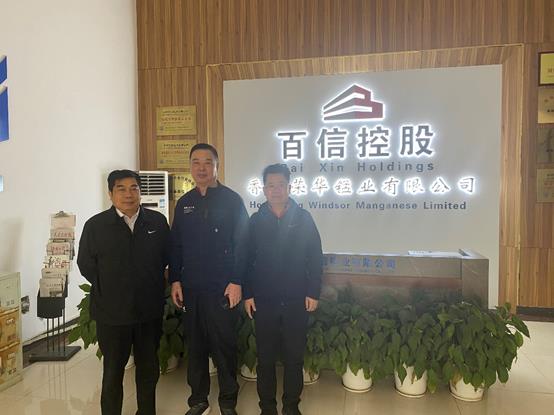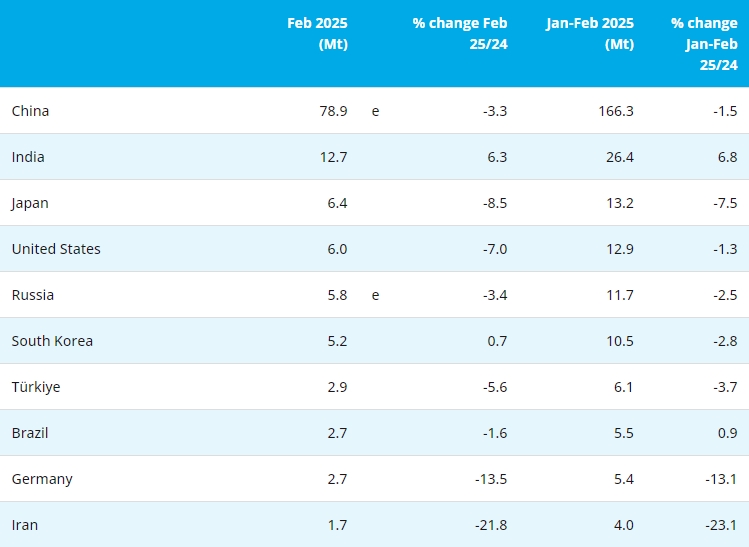
Cost Side: At the end of January, 2024, the quotation for small-sized semi-coke in the Shenmu and Fugu areas was mostly 980-1060 CNY/T; The factory price of silica in Qinghai and Ningxia regions was 200-250 CNY/T; The price of 70# oxide skin in Hebei was 1000-1030 CNY/T; The electricity price in Inner Mongolia was around 0.39-0.52 CNY/kWh. The overall cost side remained stable.
Spots Market: In the traditional off-season, the demand side further weakened. From January to February 2024, HBIS Group tendered 2656 tons of ferrosilicon 75B at a price of 7020 CNY/T, a decrease of 80 CNY/T from December; It was understood that Baosteel set FeSs75Al1.5-B ferrosilicon tender price at 6850 CNY/T in February, a decrease of 200 CNY/T compared to January; The magnesium metal market also lacked demands and operated weakly. Under the influence of bearish factors, the ferrosilicon futures market was fluctuating downward, and the spot market was operating under pressure. Transactions were not smooth, and emotions were low. Although some manufacturers in the main production areas have taken measures to avoid peak production or reduce production, the overall supply reduction was limited (according to statistics, the national ferrosilicon production in January was expected to be around 470000 tons, a decrease of about 12000 tons compared to December, and a decrease of about 44500 tons compared to the same period last year). The market was mostly wait-and-see, and operations ware cautious. At the end of the year, due to inventory and financial pressure, some manufacturers had a strong shipping mentality and slightly lowered their prices. At the end of the month, the quotation for 72# ferrosilicon standard blocks in the main production areas was mostly around 6350-6500 CNY/T, while the quotation for 75# ferrosilicon standard blocks was mostly around 7100-7200 CNY/T.
Futures Market: In January, 2024, the main contract 2403 continued declining overall. The monthly opening price was 6760, the highest price was 6872, the lowest price was 6596, the closing price was 6648, the settlement price was 6708, the position was 103089, the trading volume was 2557969, and the transaction amount was 85.9741 billion yuan, a decrease of 1.89%.

Export Data: According to data of China Customs, in December 2023, China's exports of ferrosilicon (containing by weight more than 55% of silicon) amounted to 23643.955 tons, a decrease of 7986.586 tons compared to the previous month, a decrease of 25.25%; A year-on-year decrease of 11390.865 tons, a decrease of 32.51%. In December 2023, China's exports of ferrosilicon (containing by weight ≤55% of silicon) reached 1993.25 tons, a decrease of 685.3 tons compared to the previous month, a decrease of 25.58%; A year-on-year decrease of 772.05 tons, a decrease of 27.92%. From January to December 2023, China exported 379353.177 tons of ferrosilicon (containing by weight more than 55% of silicon), a year-on-year decrease of 253844.179 tons, a decrease of 40.09%. From January to December 2023, China exported 27374.834 tons of ferrosilicon (containing by weight ≤55% of silicon), a year-on-year decrease of 534.457 tons, a decrease of 1.91%.
Steel Market: In the traditional off-season of January, the demand for steel has significantly decreased, and market transactions have shrunk. The production end has also tightened, and the steel market has shown a weak supply&demand situation. The upward trend of raw material prices has slowed down, and steel prices have slightly fluctuated and decreased. According to statistics from the CISA, the decrease in production was not as much as expected, and inventory was beginning to accumulate. There may be an increase in the later stage of supply and demand contradictions. Although stimulated by macroeconomic policies, the expectations for the later steel market have improved and prices have rebounded to some extent, overall, steel prices showed a fluctuating downward trend in January. Before and after the Chinese New Year holiday in February, the demand for downstream steel would continue to decrease, and the production of steel mills would also decline. According to the past conventions, the market was expected to recover after the Lantern Festival (the end of February) and the steel price in February would mainly fluctuate in a narrow range.
Metal Magnesium Market: There has been no significant improvement in demand but unfavorable factors such as rising shipping costs and difficulties in shipping in overseas markets, the operation of the magnesium market was overall weak and stable in January 2024. During the mid to late period, activity once increased, with a price increase of 300-400 CNY/T. However, the acceptance of high prices was low. After a brief rebound, it fell again. As the Chinese New Year approached, downstream stocking has been mostly completed and procurement has decreased. Some factories were considering inventory or financial pressure and slightly reduced prices. At the end of the month, the mainstream ex-factory cash quotation including tax of 99.9% magnesium ingots in Fugu area was mostly around 20000-20100 CNY/T.

Domestic Steel Mills Tender Prices – Feb, 2024
|
Commodity |
Steel Mills |
Price (RMB/T) |
Month on Month (RMB/T) |
Volume (Tons) |
|
FeSi75-B (72#) |
HBIS Group |
7020 |
-80 |
2656 tons in Jan-Feb |
|
FeSi75-B (72#) |
A local steel mill in Shandong |
6990 |
/ |
2000 tons |
|
FeSi75-B (72#) |
Guangxi Shenglong Metallurgical Co.,Ltd |
6900 |
/ |
1000 tons |
|
FeSi75-B (72#) |
KISC |
7090 |
-130 |
900 tons |
|
FeSi75-B (72#) |
Chongqing Iron & Steel (Group) |
6920 |
-140 |
800 tons |
|
FeSi75-B (72#) |
Yunnan Chenggang Group |
/ |
/ |
800 tons |
|
FeSi75-B (72#) |
Minyuan Steel Group |
/ |
/ |
500 tons |
|
FeSi75-B (72#) |
Baosteel |
6850 |
-200 |
400 tons |
- [Editor:kangmingfei]



 Save
Save Print
Print Daily News
Daily News Research
Research Magazine
Magazine Company Database
Company Database Customized Database
Customized Database Conferences
Conferences Advertisement
Advertisement Trade
Trade














 Online inquiry
Online inquiry Contact
Contact

Tell Us What You Think